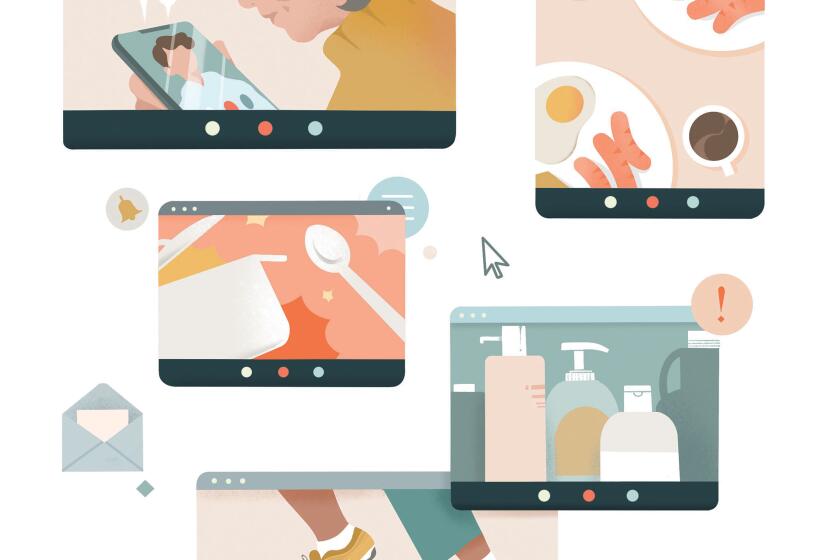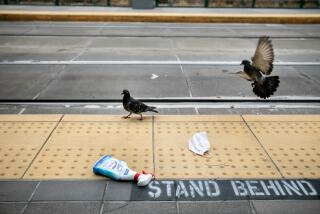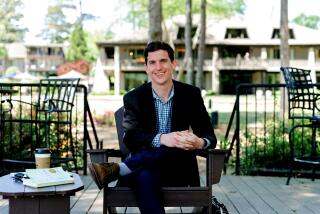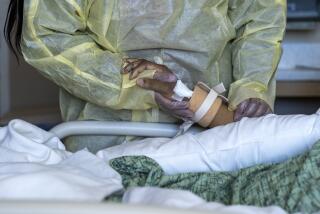Op-Ed: My father has COVID-19 and is captive in a nursing home. I dream of breaking him out
For much of the fall, I’ve had nightly dreams about rescuing my father. Here’s why: COVID-19 had spread like wildfire through his nursing home in Wisconsin. A dozen patients died from it; he contracted it too. He was locked in his tiny room, alone except when nurses delivered meals and fed him. A television kept him company, tuned to CNN until his blood pressure spiked during the election and the nurses switched it to the Hallmark Channel.
His room’s only window looks out on a courtyard set in the middle of the large care facility. “Why did we go with a courtyard view?” I asked my mother over the phone.
“Because we thought it was better for your dad than looking out on a parking lot,” she said.
She couldn’t have known it would come to this, that her only chance of seeing him would be through windows from the parking lot.
Nearly 1,700 miles away in Los Angeles, I would wake up in the night with wild ideas about rescue plots and couldn’t fall asleep until I’d written them down. In the daytime, I would plan.
In our “Dispatches From the Pandemic” series, we bring you personal stories from people whose lives have been altered by COVID-19.
I devised three schemes to swoop into the courtyard and climb through his window, even just sit beside it, to let him know he’s not alone. The missions required a helicopter, parachutes and a two-story ladder. They involved knowing how to jump out of a helicopter, land with a parachute without breaking any limbs and how to traverse a shingled rooftop two flights up. I channeled my desperation into planning a rescue, Googling “best shoes to wear when running on a shingled roof,” the iPhone equivalent of pacing for hours, wringing my hands.
I drew out the plans and sent them to my siblings, disclaiming “Blueprints not to scale.” And they didn’t judge me for my magical thinking because they were doing it too. “What about a crane to lower us in?” my brother wrote back. “We really should think about a crane.” More than twice, my mother floated the idea about trying to sneak into the building in a full hazmat suit.
“He shouldn’t be alone,” she said. “He must be wondering where I am.”
And yet, he has been alone. He will be alone, without family, on Christmas just as he was on Thanksgiving.
Before he was who he is now, before the Parkinson’s and dementia overtook him, our father was a “what can I do, how can I help” sort of man. How many times did he save us when we were growing up? Sometimes catching us even before we fell, it seemed. Our pain hurt him worse. He was always there for us, missed nothing, came to all of our recitals and plays, even when it meant taking flights to our colleges to see them.
We need to show up for him now.
We’ve lost him bit by bit over the last three years; he’s gone but not gone. But we don’t want to lose him like this. He could die of this virus or loneliness, or both. He has lost his ability to speak. It’s impossible to know what he knows about the virus, or what he could be thinking. Does he even know we’re not allowed to visit?
One morning I asked myself: What would my dad want me to be doing right now with my energy and time? The answer came to me surprisingly fast — he would want me to help others. I believe that’s what he would be doing if he were able. I started Googling things I could do, ways I could help, without helicopters and parachutes.
So I sign up to write 250 postcards to Georgian voters for their upcoming special election. I reach out to two local shelters and contributed to their holiday toy drives. My husband, daughters and I fill a needy family’s Christmas wish list. My days quickly become a different type of frenzied, full of action and doing. This sense of purpose amid a pandemic of helplessness helps me feel less helpless. What can I do, how can I help? I stop waking in the middle of the night.
Still, I can’t stop thinking about my father, wondering, worrying, wishing. Does he know what’s happening outside his tiny, locked room? Does he know that his three children, who are deathly afraid of heights, would jump out of a plane or helicopter, parachute off a roof, solely to keep him company, even if it meant just sitting outside his window?
He does not. We cannot save our father. And of course, the rescue we really want to pull off is not just to keep him company, but to take him out of that place, to steal him back, restore him to his healthy self, reclaim him as the man who helped raise us. We want to carry him away, back to before.
Carrie Friedman is a writer in Los Angeles.
More to Read
A cure for the common opinion
Get thought-provoking perspectives with our weekly newsletter.
You may occasionally receive promotional content from the Los Angeles Times.











